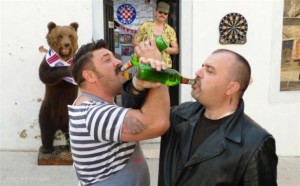
Halfway into the cold February of 2012 at ECLA, it hardly seemed like the shortest month of the year. With the Annual Conference 2012 behind us and a winter trip pending, a few midterm assignments here and there and the usual everyday coursework, the stubborn snow was the only reminder that this cold winter still hadn’t packed its bags and departed.
Berlin itself was, as always, no less eventful and lively, with one particular event standing out and capturing most of the world’s attention – the 62nd annual Berlin International Film Festival “Berlinale”. The endless queues in front of the ticket counters throughout the city and the frequent reloads of the online ticket store listing ever more screenings as ‘sold out’, hardly came as a surprise, any more than the euphoric excitement of those lucky enough to secure a ticket.
Well, all the four leaf clovers I’ve found in my life must have united their powers, because not only did I literally stumble upon the last available ticket for a screening, but it was also the one I most wanted to attend.
I have to admit that, despite the pleasure I derive from the cinematic experience (with three film electives over two terms in my Academy Year at ECLA), I am even better at second-guessing myself: soon after the initial excitement, I started to wonder if there could have been a better way to use the aforementioned collection of four leaf clovers.
Luckily, there wasn’t enough time for this hesitation to do any significant damage, as the screening was due in less than 8 hours. In fact, my doubts dispersed as soon as I arrived at the crowded and vibrant Arkadia am Potsdamer Platz where I needed to pick up my actual ticket.
Admittedly, part of the pleasure that overcame the doubt consisted in moving past the long, jealous-eyed queues to the Internet Ticket Counter and the acknowledging smile of the box office girl for picking up the last ticket to the show (I realize as I’m writing this, that some of it may have only happened in my head, but that’s irrelevant).
It is not completely without reason that I dedicated the first half of this article to the pre-screening experience instead of talking about the actual film—with more than four hundred of them showing this year, I think that the greatest common denominator for most, if not all, the visitors is this particular pre-show adrenaline rush.
The Parade, a co-production of four former Yugoslav republics (Serbia, Croatia, Macedonia and Slovenia), directed by Srdjan Dragojevic, made part of the “Panorama” programme at the 2012 Berlinale—a category that features independent and art-house films dealing with controversial subjects—in this case, LGBT (lesbian, gay, bisexual and transgender) rights.
Set ten years after the failed attempt at a Gay Pride parade in Belgrade, Serbia, which ended in bloodshed caused by violent nationalist and neo-Nazi groups, and the idleness of police authorities, it tells the story of Radmilo and Mirko, a young and successful gay couple who turn to Lemon, a homophobic gangster-turned-private bodyguard, for help in organizing a new pride parade.
Under his beloved fiancé’s pressure, he reluctantly accepts, despite the deadly risks involved and the scorn of his estranged son, a leader of one of the gay-bashing gangs.
As dramatic as the story sounds so far, it would be untypical for a film coming out of this cinematic region to not rely on comedy to deliver the message: the twist here is that Lemon has to go on a road trip around the former Yugoslav republics and enlist former enemies in the Yugoslav wars: Niko, a Croatian Ustashe; Halil, a Bosnian Muslim and Azem, an Albanian from Kosovo.
Characters filled with over-exaggerated regional stereotypes and absurd situations make the message of tolerance this film carries, “more easily digestible,” in the words of the director at the panel discussion following the screening, “and appealing not only to audiences in former Yugoslavia, but also abroad,” as one could have judged by the, (for me—surprisingly), overwhelming presence of “outside” viewers in the audience.
Despite the difficulties of translating humour (particularly evident in the failure of English subtitles to correspond to the richness of Serbo-Croatian profanity), it proved a successful vehicle for transmitting an important message. As with many films belonging to the former-Yugoslav school of cinema, the inevitable fall into the comedy genre was accompanied by something rather different from “comic relief”—something one may call “tragic relief” –expressing the weight and seriousness of the message.
Ending on that note, I leave you with the recommendation to see The Parade (or any of the movies featured at the Berlinale for that matter) and to not underestimate the educational power of a good laugh.
by Blagojce Nestorov (AY’12, Macedonia)
